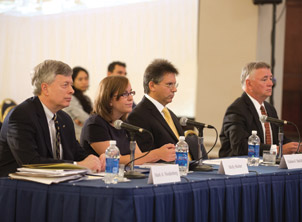Advocates Lay Out the Details to Senate Panel
University of Pittsburgh Chancellor Mark A. Nordenberg presented the University’s case for a restoration of adequate state funding during a Sept. 12 Pennsylvania Senate Appropriations Committee hearing on Pitt’s campus. The Chancellor made his remarks before a packed audience in Alumni Hall’s Connolly Ballroom. (See article, "Chancellor Makes Case to Senate Panel.")
 Addressing the committee on Pitt’s role as a provider of high-quality higher education were (from left) Chancellor Nordenberg; Molly Stieber (A&S ’13), president of Pitt’s Student Government Board; Graham Hatfull, Eberly Family Professor and Howard Hughes Medical Institute Professor; and Stephen Tritch ((ENGR ’71, MBA ’77), chair of the Pitt Board of Trustees.
Addressing the committee on Pitt’s role as a provider of high-quality higher education were (from left) Chancellor Nordenberg; Molly Stieber (A&S ’13), president of Pitt’s Student Government Board; Graham Hatfull, Eberly Family Professor and Howard Hughes Medical Institute Professor; and Stephen Tritch ((ENGR ’71, MBA ’77), chair of the Pitt Board of Trustees.Chancellor Nordenberg then handed the microphone over to an impressive cadre of speakers—a Pitt student, two professors, the University’s Board of Trustees chair, a top economic development official, and Carnegie Mellon University President Jared Cohon—who laid out, in no uncertain terms, the University’s value as an educational institution and economic development engine.
The Pitt hearing—comprising two panel sessions that lasted a total of nearly four hours— was the second of four hearings that the Senate Appropriations Committee is holding across the state at Pennsylvania’s four state-related universities: Pitt, Penn State, Temple, and Lincoln. Penn State’s hearing was held Sept. 7; sessions at Temple and Lincoln are scheduled for Oct. 12 and 13, respectively.
The hearings’ purpose is to allow Senate committee members to delve more deeply into the funding issues surrounding each of the four state-related universities and to determine—at a time when both public universities and states face extremely tight budgets—how Harrisburg should make the wisest investments in appropriating Pennsylvania taxpayers’ funds.
The issue is of particular interest because Pennsylvania’s governor, who inherited a $4 billion deficit when he took office in January 2011, initially announced a proposed budget with 50 percent appropriation cuts for Pitt and the other state-related universities this fiscal year, which began July 1. While Pitt and the other schools were able, through legislative negotiations, to avoid a significant portion of the proposed cuts, the University is nevertheless operating this fiscal year with a still-massive 22 percent reduction in state funding, requiring difficult budget-cutting decisions, partial salary freezes, and tuition increases. Overall state spending was cut by just 4 percent, making Pitt’s cuts both deep and disproportionate.
The six speakers who testified along with Chancellor Nordenberg sought to make it clear to legislators that adequate funding of Pitt is essential to the continuation of the University’s high-quality academics and research, as well to the region’s economic growth.
Stephen R. Tritch (ENGR ’71, MBA ’77), chair of Pitt’s Board of Trustees and retired Westinghouse chair and CEO, recalled for the committee how Pitt’s presence—both as a source of talent and as a research partner—played a role in Westinghouse remaining in the greater Pittsburgh area once it had outgrown its Monroeville location a few years ago. He also lauded the quality of education he received at the University.
“These personal and professional experiences drive my sense of deep concern about the continuing deterioration of Pitt’s state appropriation … This university is an institution of impact,” Tritch said in his written remarks.
“… I want to stress, as the Chancellor has, that the University never expected to be exempt from the sacrifices that all must share in these difficult economic times,” Tritch added. “However, we also did not expect to be targeted for such a disproportionate share of the Commonwealth’s budget-cutting responsibilities. Looking back at my own circumstances as a college student, I am left with the fear that we seem to be abandoning the next generation of students with high potential who come from families of modest means. And looking back on my experiences as the CEO of an important business that is heavily dependent on well-educated human talent to drive the progress of its business, I worry that we seem to be retreating from support of the very institutions that will help fuel our collective success in the 21st- century economy.
“I know that the members of this committee have been strong supporters of Pitt and Pennsylvania’s other research universities. I can only hope that you will make the restoration of their appropriations to more reasonable levels of funding a high priority as you begin building the Commonwealth’s budget for the next fiscal year and for many years to come,” Tritch said.
Joining Tritch in addressing the committee about Pitt’s role as a provider of high-quality higher education were Molly Stieber, president of Pitt’s Student Government Board; and Graham Hatfull, Eberly Family Professor, Howard Hughes Medical Institute Professor, and former chair of the School of Arts and Sciences’ Department of Biological Sciences.
A second panel, which discussed Pitt’s roles as one of the nation’s leading research universities and a driver of regional economic development, included Dennis Yablonsky, CEO of the Allegheny Conference on Community Development; Jared Cohon; and D. Lansing Taylor, director of the University’s Drug Discovery Institute and the Allegheny Foundation Professor in the School of Medicine’s Department of Computational and Systems Biology.
The panelists’ comments received favorable responses from Senate committee members.
Other Stories From This Issue
On the Freedom Road

Follow a group of Pitt students on the Returning to the Roots of Civil Rights bus tour, a nine-day, 2,300-mile journey crisscrossing five states.
Day 1: The Awakening
Day 2: Deep Impressions
Day 3: Music, Montgomery, and More
Day 4: Looking Back, Looking Forward
Day 5: Learning to Remember
Day 6: The Mountaintop
Day 7: Slavery and Beyond
Day 8: Lessons to Bring Home
Day 9: Final Lessons

